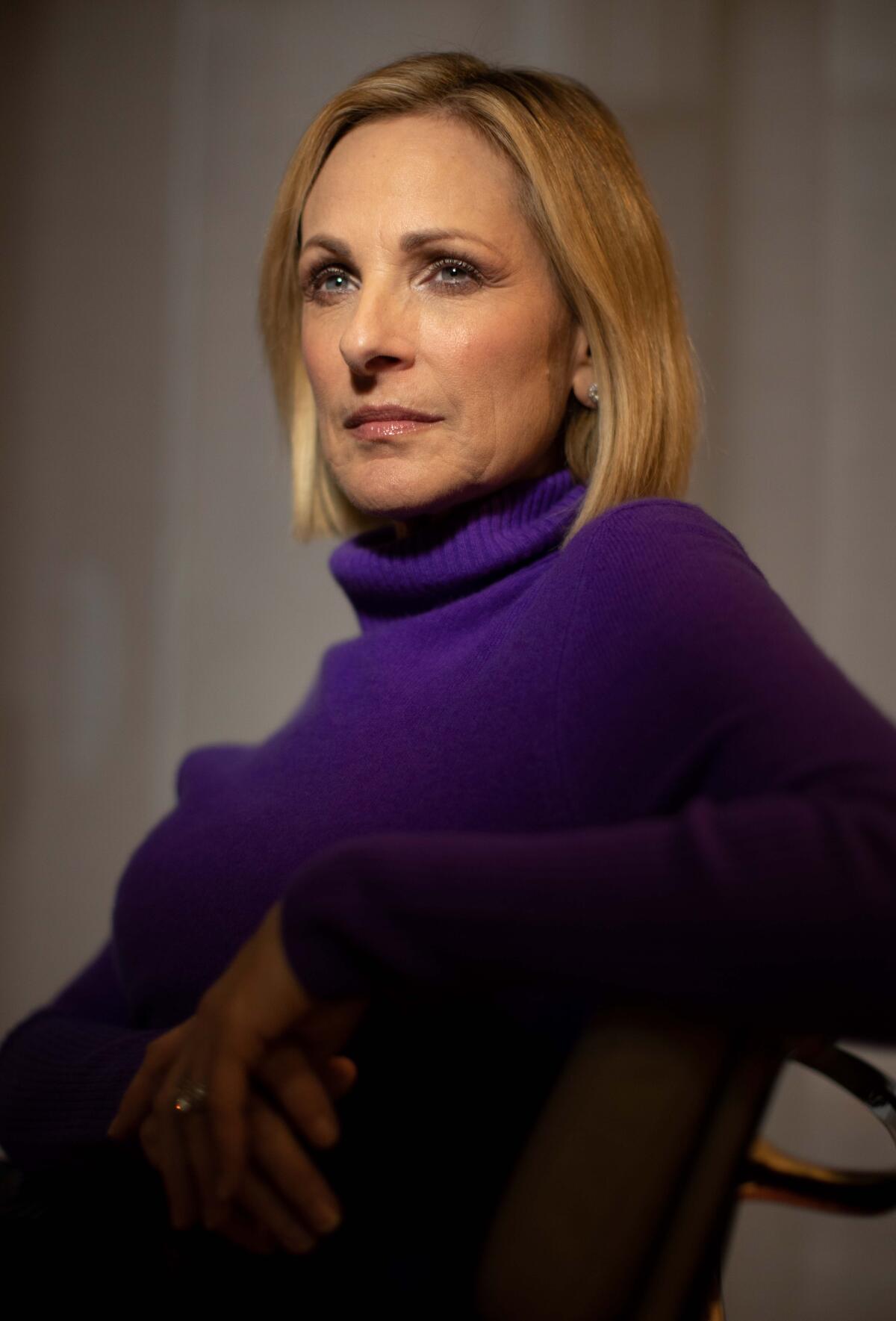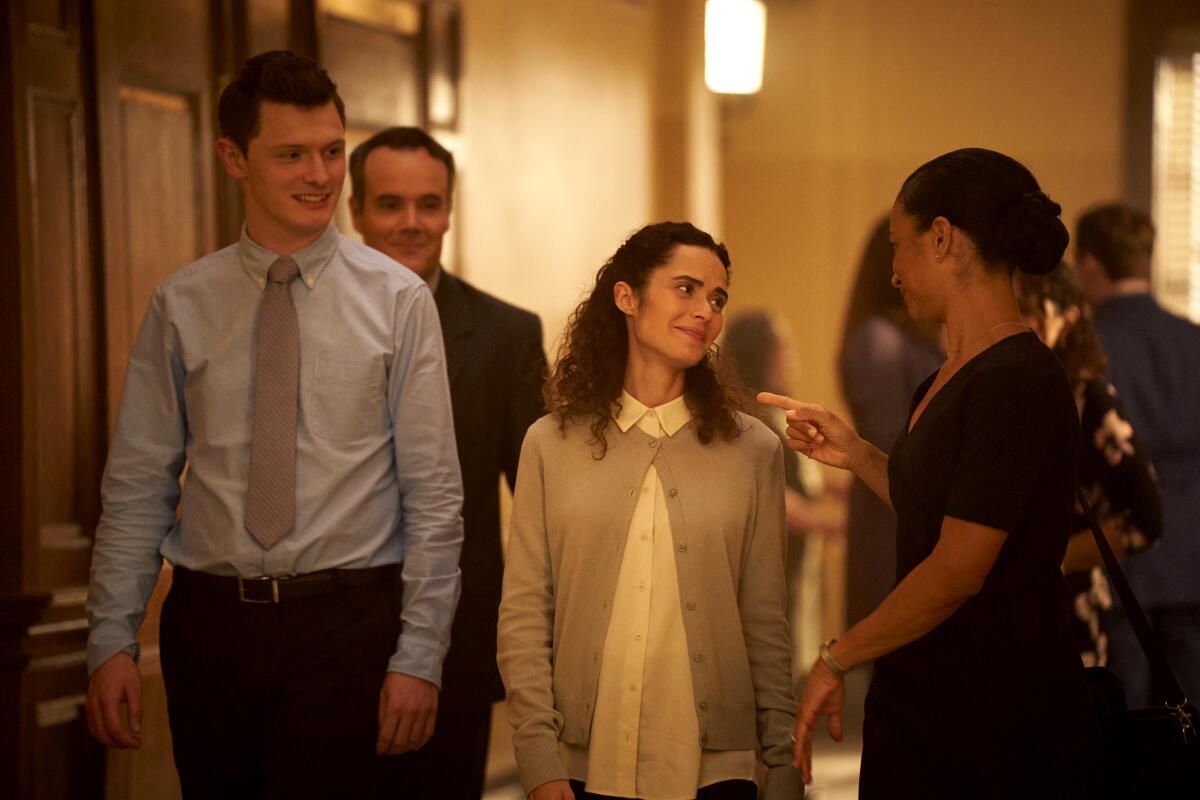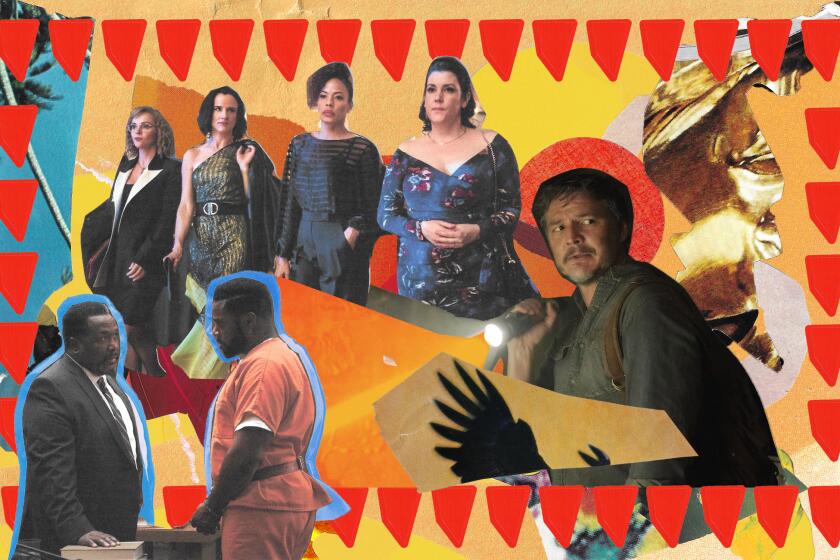‘Sometimes you felt excluded’: How debut director Marlee Matlin righted past wrongs
- Share via

ETOBICOKE, Ontario — The set of Marlee Matlin’s directorial debut is the quietest I have ever visited.
It’s not completely absent sound — there is a low murmur, people quietly conferring between takes — but it is faint enough that when the DIY air conditioner kicks in and the bag overhead suddenly inflates with a bang, I jump. In the distance, I hear “Action!” and I will later hear “Cut!” but otherwise a deferentially low volume permeates the space. The source of the minimal sound is Matlin herself: small but commanding, sporting a blond bob and pink top, directing a courtroom scene with a series of hand gestures — lots of thumbs up all around — and the occasional word. I can’t hear her interpreter from my position, but that’s partly because the two of them are always right next to whoever they’re speaking with. I do, however, hear an extras wrangler at one point loudly requesting an uptick in energy: “Big trial, big deal.”
It’s the end of June and we’re inside the huge studio complex in Etobicoke, Ontario, on Toronto’s west side, where filming is underway on Fox’s new crime anthology “Accused,” an adaptation of creator Jimmy McGovern’s (“Cracker”) 2010 British original. Produced by Sony Pictures Television and premiering Jan. 22, each episode of the series starts with a character facing a verdict in court then dives into the story of what led them there: As executive producer Howard Gordon puts it, this is less a whodunit than a what happened.

Matlin’s episode, airing Jan. 24, centers around Ava, a deaf surrogate (played by deaf actorStephanie Nogueras) who abducts the baby, who also turns out to be deaf and whose parents (Aaron Ashmore and Megan Boone) are considering cochlear implants. “Accused” uses directors with personal experience that aligns with each story, hence deaf actor Matlin, fresh off “CODA’s” awards sweep, stepping behind the camera here. (Two other deaf actors also make up the cast — Joshua Castille as Ava’s boyfriend and Lauren Ridloff as her public defender.) Says Gordon: “It was really compelling to us to be able to tell the story with some depth with someone who has actually been at the front line between the hearing world and the deaf world.”
For her part, Matlin does not look the least bit nervous when I meet her. Through her windowed mask, to accommodate COVID-19 restrictions and allow for lip reading, she emanates competence and warmth — even on the final days of a nine-day shoot, and despite my own communications learning curve: I know to watch her instead of the interpreter — everyone on set was given a best practices sheet — but I am so habituated to watching who is speaking that I keep doing it by mistake anyway.
The entertainment experts at The Times select the TV shows we’re most looking forward to this year.
Matlin is, in short, the kind of person you want in charge in an emergency. During a subsequent Zoom interview, I say one of my questions is lame and she cheerfully scolds: “Stop being negative!” She reminds me of my mother, a woman who refuses not to brightly soldier on.
The way the “Accused” gig came to Matlin would instill positivity in anyone: Her agent mentioned to Gordon that she wanted to direct; at that precise moment, Gordon had the perfect script for her. “I guess it just happened at the right time when I was thinking about it,” Matlin says. “It was almost like karma.” Her initial interest came from the fact that it was a story about her community, her culture, her language. She hasn’t been a surrogate, but she could identify with the “protective instinct for a baby who happens to be deaf.”

Ironically, though, Gordon’s initial idea was simply an episode about surrogacy, based on a real story he read about a baby with Down syndrome. It was Maile Meloy, the short story writer and friend of Gordon’s to whom he had pitched the show at a party, who conceived of the idea of the deaf surrogate.
Meloy had already been taking American Sign Language (ASL) classes because she was working on the Netflix show “Society,” which had a deaf character. When the series shut down during the pandemic, she continued learning the language and about Deaf culture. At the same time, she had read Andrew Solomon’s “Far From the Tree,” about traits children don’t always share with their parents. Meloy realized that what Solomon had written about scientific advances outpacing the ethics around them applied to deafness as well. Matlin came on during the outline stage and read every draft.
Even before they hit the set, Meloy was convinced Matlin was up to the job. “I knew from watching her as an actress and an activist that she’d be a great director,” she says. “She’s so confident and magnetic that people just want to follow her.”
That confidence isn’t impervious to setbacks, though, and Matlin remembers the beginning of the pandemic as a difficult period. “Sometimes you felt excluded, because masks weren’t always like the masks that we had on the set,” Matlin says. “It didn’t feel good for me as somebody who depends on lip reading.” The majority of the time, she communicates face to face during a take, which I noticed during the shoot — she was either leaning over a desk next to a cast member or standing right in front of them. To communicate, Matlin uses a combination of her own voice, interpreters and signing. (There are variations between Canadian and American signing, as there are across all countries, but as Meloy points out, signing is still useful if you are speaking to someone across the room and want to keep a quiet set.)
“The only difference between the hearing actors and the deaf actors was the fact that I could sign freely with the deaf actors,” Matlin says. “The actual job of directing them was the same.”
Which is not to say she didn’t ask for help before the shoot. Matlin reached out to a couple of people to ask what she needed to be aware of as a first-time director. And everyone told her the same thing — that she would be asked endless questions and should always have an answer prepared. She narrowed it down to five: yes, no, maybe, what do you think, and I don’t know.
Matlin gives a longer answer when I ask her how far Hollywood has come in its treatment of deaf talent. She says between 1986’s “Children of a Lesser God,” her Oscar-winning film debut, and 2021’s “CODA,” which won the best picture Oscar and in which she starred alongside two other deaf actors, the change had been “really slow.” But when she got the script for “CODA,” she knew that was the tipping point. “The bottom line is that you had three authentic deaf actors carrying the film — we weren’t background, we weren’t, you know, little tokens,” she says. “[There were] so many things that struck people that were new, but yet so familiar … Now they realize we exist.”
More to Read
The complete guide to home viewing
Get Screen Gab for everything about the TV shows and streaming movies everyone’s talking about.
You may occasionally receive promotional content from the Los Angeles Times.







